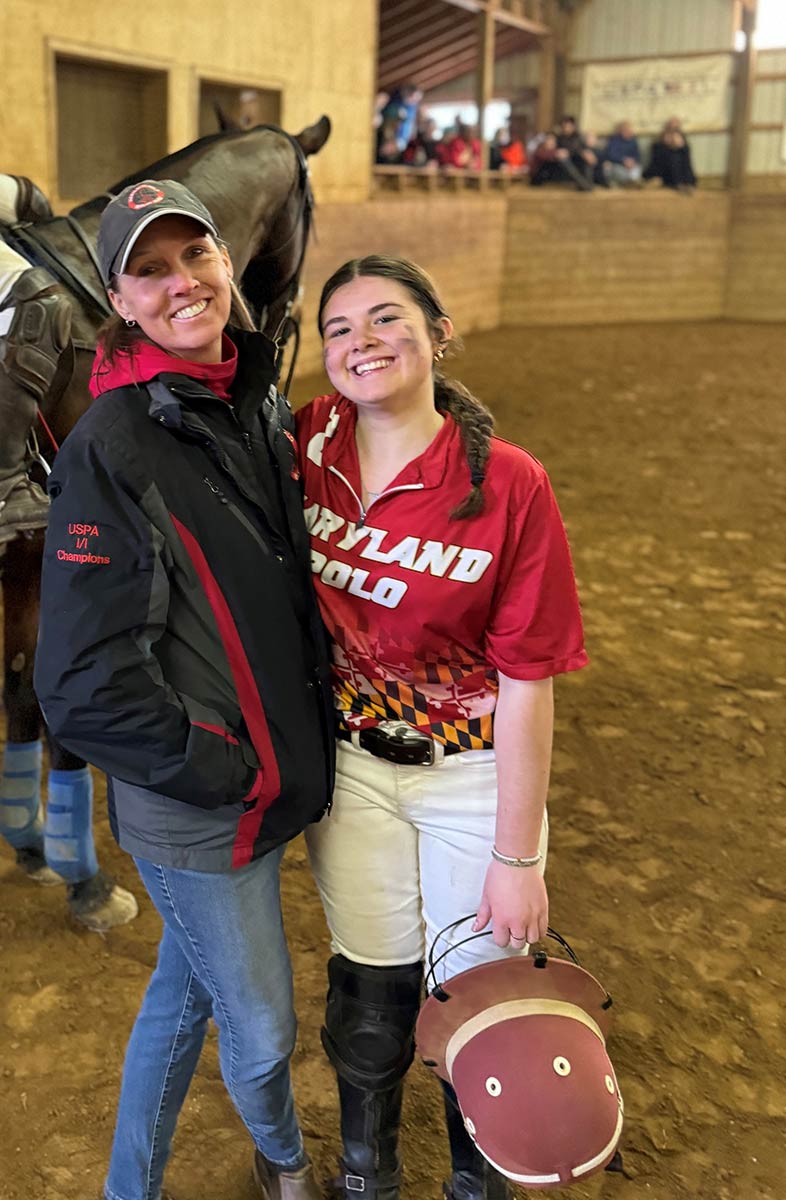 Coach Kelly Wells and Sierra Blevins at the National Interscholastic Polo championships. Credit Mike Ryan
Coach Kelly Wells and Sierra Blevins at the National Interscholastic Polo championships. Credit Mike Ryan
Kelly Wells of Marlan Farm in Freeland, MD says she “dabbled a bit with polo as a teenager.” She grew up immersed in polo but pursued equestrian glory in the show ring.
“My dad played polo and my uncles played too. I did a lot of showing and focused on that.” Until she went to Cornell, where she “broke out of the show ring,” and went wholeheartedly into polo. The road almost-not-taken has led Wells to extraordinary success as a player and a coach.
First stop: Garrison Forest, the private college preparatory school in Owings Mills, MD, a school focused on preparing young women for success in college and beyond. The school was looking for a polo coach in 1997, and Wells was looking for a job. “I have a degree in teaching,” she says, “but I didn’t think that I would be teaching polo until I got the job at Garrison Forest.” She stayed at Garrison Forest “cutting my teeth there,” for six years.
It was an outstanding program in which to begin her career. Garrison Forest’s polo team had amassed 14 National Interscholastic Championships, capped by a run of seven titles from 1992-1998.
Arena Polo vs. Outdoor Polo
Wells coaches arena polo, which is somewhat different from outdoor polo. To begin, arena polo is played indoors, in a ring measuring 300 feet by 150 feet. The arena is surrounded with four-foot walls. Compare that to arena’s “cousin,” outdoor polo, which is played on a 10-acre field and no walls. Both versions have seven and a half-minute chukkers, or periods. In arena there are generally four chukkers, whereas in outdoor polo there could be up to six chukkers, depending on the players’ handicaps. High goal matches would have six chukkers, and feature teams with combined handicaps of 20 or more. These matches are the most competitive. Polo handicaps range from minus two, which is a novice player, to ten.
For perspective, higher handicaps in polo are good; higher handicaps in golf? Not so good.
A Nearly Unbroken Record of Success
After leaving Garrison Forest, Wells started down another path, and in 2004 she began coaching polo at her own farm in Freeland. It was the opening chapter of a stellar record, culminating on March 10, 2024, with a spectacular performance, as detailed by the United States Polo Association (USPA). “Sunday’s win marks another victory for Maryland Coach Kelly Wells, who now holds the record for most Girl’s National Interscholastic Championship wins with 14 total: 10 National Championships with Maryland and four with Garrison Forest School.”
Wells loves to win, and her record illustrates that. “We either win, or come in second,” she says, considering her teams’ performances over the years. And she is not strictly a coach. She continues to compete, throughout the region and even internationally. “I do still compete regularly both in the arena and outdoors on the grass,” she says. “I generally play on teams with my students to give them experience playing competitive polo at a higher level.”
One of her favorite players is her daughter, Marissa, who also coaches with Wells at Marlan Farm. “I enjoy playing with my daughter in women’s events and traveling the world to play in international tournaments.” She and Marissa played with two of their 14-year-old students in a tournament in New Zealand in February. The outcome? They won!
In addition to building championship teams, Wells develops individual champions. According to the USPA, a piece of history repeated itself with Wells’ most recent championship. Isabelle Brockett, one of the Maryland players, is the daughter of Arabella Brockett, who played on the 2001 championship team from Garrison Forest. Coached by Wells.
Wells credits the riding teachers she had early in her equestrian career. “I had good teachers who helped me,” she says. Throughout her early years with horses, her teachers focused on horsemanship and equitation. “They helped me learn how to teach riding.”
A Sport Facing Challenges
Despite the success of Wells’ program, she knows there are challenges. “The cost of horses is really high,” she says. “In the past, prices were more reasonable. But during COVID people wanted to ride and they scooped up all the horses.”
And the nature of polo as a sport presents a lot of issues. “Polo takes a while to progress. It’s challenging to get kids and families to commit to the time.” She says that one of the programs she runs is a summer pony camp. “It’s my channel to get kids into the program,” she explains.
And those kids fall in love with horses and the sport. Each season she has three or four teams to coach, and, proof of her successful formula, “many of my students go on to play college and professional polo.”




